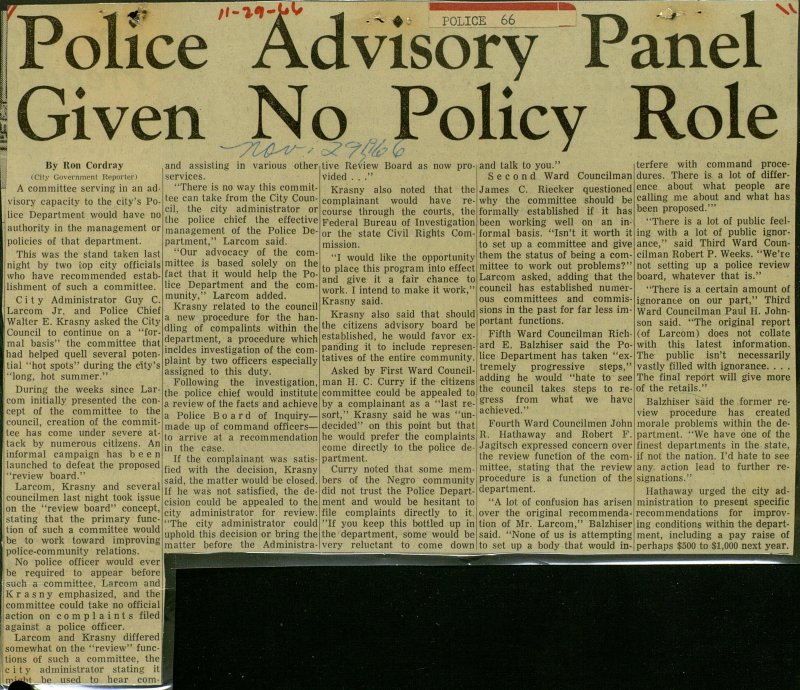Police Advisory Panel Given No Policy Role

A committee serving in an advisory capacity to the city's Pólice Department would have no authority in the management or policies oí that department. This was the stand taken last night by two 'top city officials who have recommended establishment of such a committee. City Administrator Guy C. Larcom Jr. and Pólice Chief Walter E. Krasny asked the City Council to continue on a "formal basis" the committee that had helped quell several potential "hot spots" during the city's "long, hot summer." During the weeks since Larcom initially presented the concept of the committee to the council, creation of the committee has come under severe attack by numerous citizens. An informal campaign has been launched to defeat the proposed "review board." Larcom, Krasny and several councilmen last night took issue on the "review board" concept, stating that the primary function of such a committee would be to work toward improving police-community relations. No pólice officer would ever be required to appear before such a committee, Larcom and Krasny emphasized, and the committee could take no official action on complaints filed against a pólice officer. Larcom and Krasny differedi somewhat on the "review" functions of such a committee, the city administrator stating it miflit be used to hear com-l and assisting in various other services. "There is no way this committee can take from the City Council, the city administrator or the pólice chief the effective management of the Pólice Department," Larcom said. "Our advocacy of the committee is based solely on the fact that it would help the Police Department and the community," Larcom added. Krasny related to the council a new procedure for the handling of compalints Within the department, a procedure which incides investigation of the complaint by two officers especially assigned to this duty. Following the investigation, the pólice chief would instituto a review of the facts and achieve a Pólice Board of Inquiry - made up of command officers - to arrive at a recommendation in the case. If the complainant was satisfied with the decisión, Krasny said, the matter would be closed. If he was not satisfied, the decisión could be appealed to the city administrator for review. "The city administrator could uphold this decisión or bring the matter before the tivc ReView Board as now provided . . ." Krasny also noted that the complainant would have recourse through the courts, the Federal Bureau of Investigation or the state Civil Rights Commission. "I would like the opportunity to place this program into effect and give it a fair chance to work. I intend to make it work," Krasny said. Krasny also said that should the citizens advisory board be established, he would favor expanding it to include representatives of the entire community. Asked by First Ward Councilman H. C. Curry if the citizens committee could be appealed to by a complainant as a "last resort," Krasny said he was "undecided" on this point but that he would prefer the complaints come directly to the pólice department. Curry noted that some members of the Negro community did not trust the Pólice Department and would be hesitant to file complaints directly to it. "If you keep this bottled up in the department, some would be very reluctant to come down and talk lo you." S e c o n d Ward Councilman James C. Riecker questioned why the committee should be formally established if it has been working well on an informal basis. "Isn't it worth it to set up a committee and give them the status of being a committee to work out problems?" Larcom asked, adding that the council has established nuraerous committees and commissions in the past for far less important functions. Fifth Ward Councilman Richard E. Balzhiser said the Police Department has taken "extremely progressive steps," adding he would "hate to see the council takes steps to regress from what we have achieved." Fourth Ward Councilmen John R. Hathaway and Robert F. Jagitsch expressed concern over the review function of the committee, stating that the review procedure is a function of the department. "A lot of confusión has arisen over the original recommendation of Mr. Larcom," Balzhiser said. "None of us is attempting to set up a body that would terfere with command procedures. There is a lot of difference about what people are calling me about and what has been proposed."' "There is a lot of public feeling with a lot of public ignorance," said Third Ward Councilman Robert P. Weeks. "We're not setting up a pólice review board, whatever that is." "There is a certain amount of ignorance on our part," Third Ward Councilman Paul H. Johnson said. "The original report (of Larcom) does not collate with this latest information. The public isn't necessarily vastly filled with ignorance. . . . The final report will give more of the retails." Balzhiser said the former review procedure has created morale problems within the department. "We have óne of the finest departments in the state, if not the nation. I'd hate to see any action lead to further resigna tions." Hathaway urged the city administration to present specific recommendations for improving conditions within the department, including a pay raise of perhaps $500 to $1,000 next year. I
Article
Subjects
Race Relations
Michigan Civil Rights Commission
FBI
Ann Arbor Police Department
Ann Arbor City Council
Black Americans
Ann Arbor News
Old News
Walter E. Krasny
Robert P. Weeks
Robert F. Jagitsch
Richard E. Balzhiser
Paul H. Johnson
John R. Hathaway
James C. Riecker
H.C. Curry
Guy C. Larcom Jr.